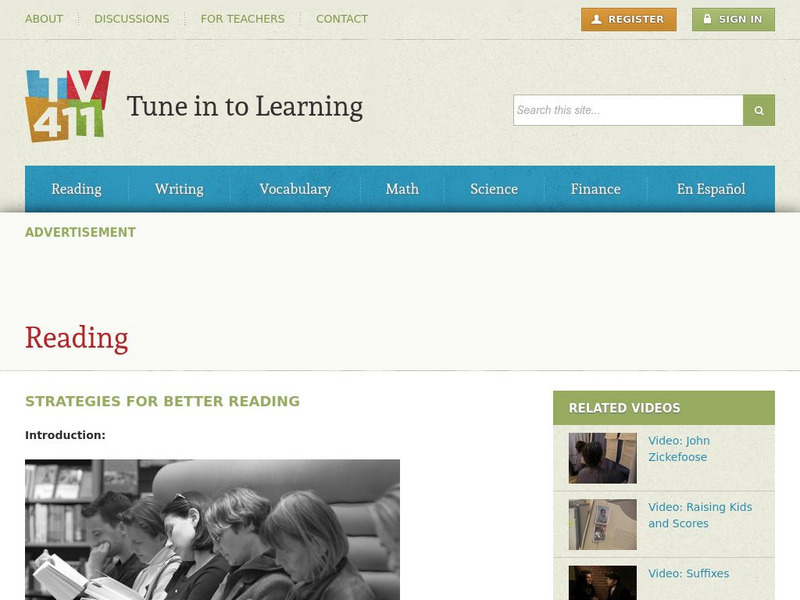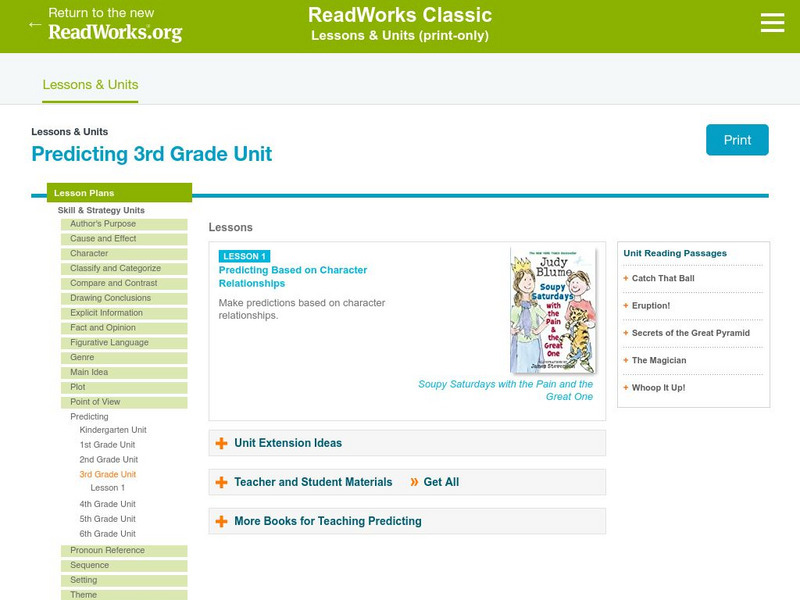Curated OER
Canada 2050: Future Population Trends
Students analyze population data and a population pyramid projection for Canada. Using this information, they predict what the future trends in the population might be and its effect on Canadian society as a whole. They compare and...
Curated OER
Inventors Unit Survey
Students develop and conduct a survey for their inventors unit. They create a five question survey and tally the survey results, and create a graph using Microsoft Word and Graph Club 2.0.
Curated OER
Cloning and Related Issues
Eighth graders research information on cloning and the surrounding issues online. They analyze the issues surrounding cloning and present their point of view with supporting details in a Powerpoint presentation.
Curated OER
Testing Weather Proverbs
Students study weather proverbs. In this weather lesson, students list weather proverbs and complete the worksheet to test the proverb. Students design an experiment to test the weather proverbs and conduct the experiments.
McGraw Hill
Read: Does Technology Make Us Lazy?
Compare these two passages for some interesting ideas about how technology affects our lives. The questions that follow ask you to identify the main idea from either direct statement or inference.
Reading Rockets
Reading Rockets: 103 Things to Do Before/during/after Reading
The highly-respected Reading Rockets program offers both teachers and students a toolkit of ways to connect more actively with the materials they read. Some of these techniques are specifically for fiction-reading, others are designed...
Better Lesson
Better Lesson: Introduction to Making Predictions and Inferences
First graders will engage in a shared reading of "Mr. C's Dinner" so that we can build a foundation for understanding what it takes to make good predictions and inferences.
Other
Daniel J. Kurland: Critical Reading: Inference: Reading Ideas as Well as Words
This college instructor offers his insights into critical reading and how to develop skills to interpret as well as comprehend the written word. RL.9-10.1, RL.11-12.1, RI.9-10.1 textual evidence and inference.
E Reading Worksheets
E Reading Worksheets: Making Predictions Worksheets and Lessons
In this learning module, students will learn more about making predictions in reading. Worksheets and a leson are provided to support Tier I, Tier II, and Tier III students.
Khan Academy
Khan Academy: Inferences About Information Quick Guide
Some questions in the Reading Comprehension section will ask you to make an inference about information in the passage. The answer may not be explicitly stated in the passage, but it will be supported by the content of the passage. In...
PBS
Pbs: Multiple Methods of Reading Instruction
This article surveys three strategies to incorporate into classroom repertoire. They include guided reading, choral reading, and readers' theater.
Mr. Nussbaum
Mr. Nussbaum: Galaxies Reading Comprehension
This learning module includes a nonfiction reading passage about galaxies including the Milky Way followed by a multiple choice self-assessment which gives students immediate feedback.
Other
Rhl School: Reading Comprehension: Using Inference
A good warm-up/introduction activity for a unit on inferences. This is a simple exercise to help teachers assess prior knowledge.
Read Works
Read Works: 1st Grade Unit: Supporting Predictions
[Free Registration/Login Required] A lesson utilizing the book No Roses for Harry! by Gene Zionin in which students make a prediction and then support it with details from the text. Ideas for direct teaching, guided practice, and...
Polk Brothers Foundation Center for Urban Education at DePaul University
De Paul University: Center for Urban Education: Lincoln's Choice [Pdf]
"Lincoln's Choice" is a one page, fictional, reading passage about young Abraham Lincoln saving a friend from drowning. It is followed by constructed-response questions which require students to provide evidence from the story; it...
ReadWriteThink
Read Write Think: How and Why Characters Change
This lesson plan examines and makes inferences into the change and development in characters. Included in the lesson plan is an overview, practice, objectives, resources, preparation, and more.
Texas Education Agency
Texas Gateway: Themes in Literary Texts (English 6 Reading)
Learn how to infer the implicit theme in a work of fiction, distinguish theme from topic, and make complex inferences using textual evidence.
Better Lesson
Better Lesson: Using Word and Picture Clues to Make an Inference
First graders will use text evidence to make inferences about word and word phrase meanings in a text. Word and picture clues will be used to help students form inferences.
Scholastic
Scholastic: Getting Started With Guided Reading
How do you get started with guided reading? At this site one can find the answer to this question. The online lesson plans will help get students started with guided reading.
Scholastic
Scholastic: Test Skill Builders for Reading: Making Judgments [Pdf]
Standardized test practice for students in grades 5 and 6. Students read a practice passage and answer questions that require them to make judgments about such things as fact or opinion and the author's purpose. Answers to the practice...
Education Development Center
Tv411: Tune in for Reading: Reading: Strategies for Better Reading
Self-checking interactive tutorial puts reading comprehension skills to work by asking learners to make inferences, predict what happens next, and identify the main ideas in a series of short reading passages. Related materials include...
Read Works
Read Works: Predicting 1st Grade Unit
[Free Registration/Login Required] A two-lesson unit designed to teach students to make predictions and support them with details from the text. Lessons are based on the books Wemberly Worried by Kevin Henkes and No Roses for Harry! by...
Read Works
Read Works: Predicting 3rd Grade Unit
[Free Registration/Login Required] This is a lesson plan designed to teach students to make predictions based on relationships between characters. The lesson plan is based on the book Soupy Saturdays with the Pain and the Great One by...
Polk Brothers Foundation Center for Urban Education at DePaul University
De Paul University: Center for Urban Education: Making a Difference [Pdf]
"Making a Difference" is a one page, fictional, reading passage about students helping to get their families and others to register to vote. It is followed by constructed-response questions which require students to provide evidence from...


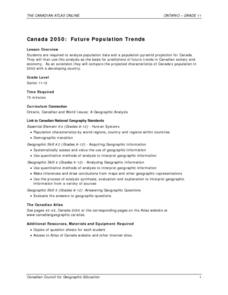






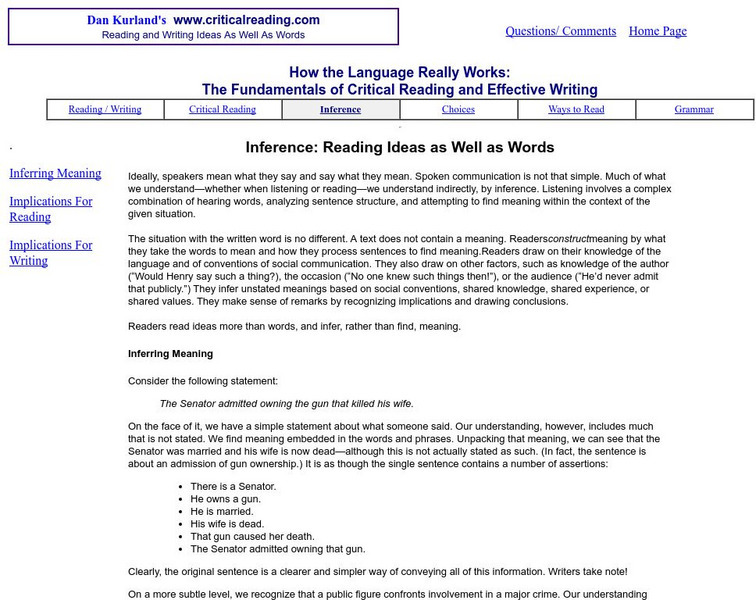




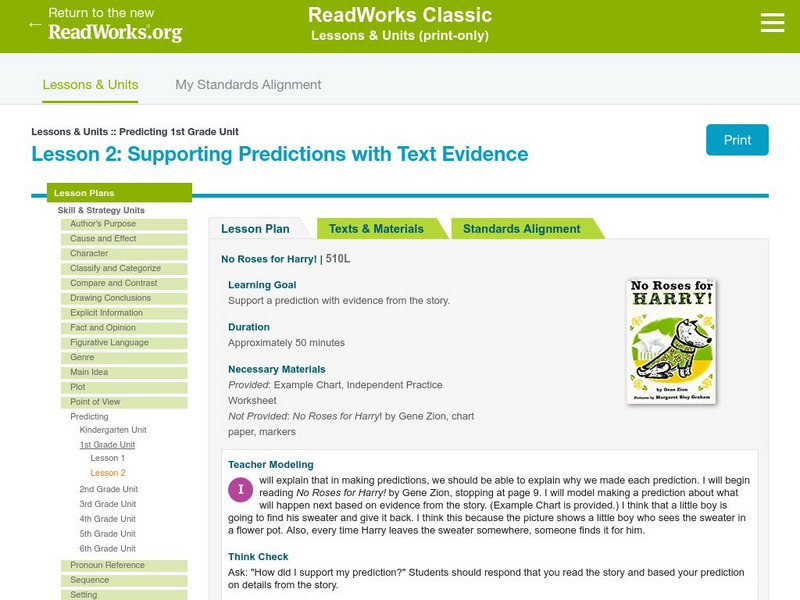
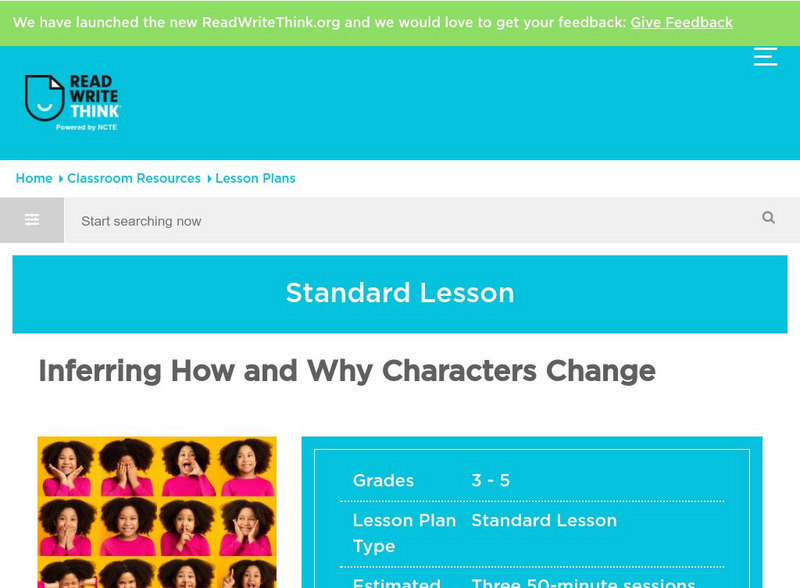


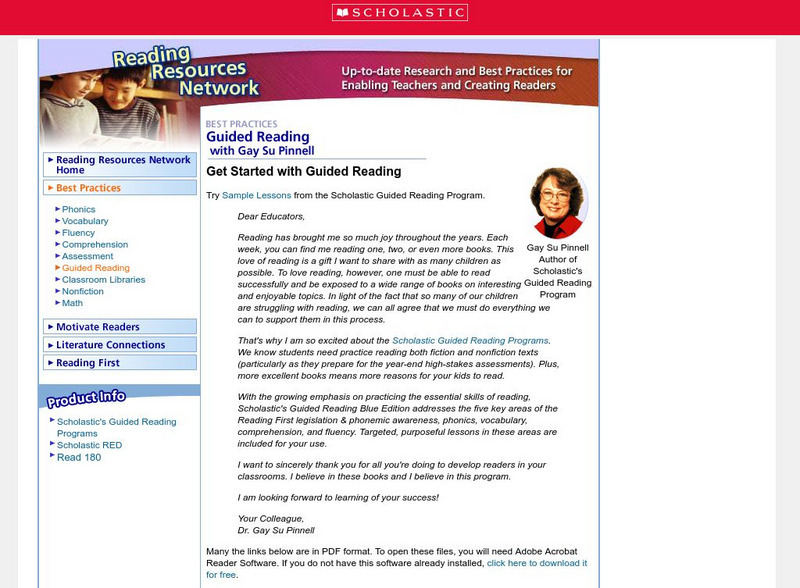
![Scholastic: Test Skill Builders for Reading: Making Judgments [Pdf] Unit Plan Scholastic: Test Skill Builders for Reading: Making Judgments [Pdf] Unit Plan](https://content.lessonplanet.com/knovation/original/480321-6f12644c5ef0c583c0ed15abcd563c89.jpg?1661251115)
